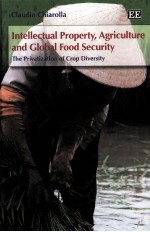图书介绍
INTELLECTUAL PROPERTY AGRICULTURE AND GLOBAL FOOD SECURITYpdf电子书版本下载

- CLAUDIO CHIAROLLA 著
- 出版社:
- ISBN:9781849807333
- 出版时间:2011
- 标注页数:232页
- 文件大小:12MB
- 文件页数:249页
- 主题词:
PDF下载
下载说明
INTELLECTUAL PROPERTY AGRICULTURE AND GLOBAL FOOD SECURITYPDF格式电子书版下载
下载的文件为RAR压缩包。需要使用解压软件进行解压得到PDF格式图书。建议使用BT下载工具Free Download Manager进行下载,简称FDM(免费,没有广告,支持多平台)。本站资源全部打包为BT种子。所以需要使用专业的BT下载软件进行下载。如 BitComet qBittorrent uTorrent等BT下载工具。迅雷目前由于本站不是热门资源。不推荐使用!后期资源热门了。安装了迅雷也可以迅雷进行下载!
(文件页数 要大于 标注页数,上中下等多册电子书除外)
注意:本站所有压缩包均有解压码: 点击下载压缩包解压工具
图书目录
1. Introduction and overview 1
1.1 General and specific objectives 1
1.2 Background and significance 4
1.3 Definition of key conceptual issues 7
1.3.1 General legal and policy framework within which the ITPGRFA arises 7
1.3.1.1 The principle of common heritage of humankind and farmers’ rights under the International Undertaking 8
1.3.1.2 From common heritage to permanent sovereignty and the principle of common concern of humankind 11
1.3.1.3 The revision of the IUPGR and the adoption of the ITPGRFA 12
1.3.1.4 Differential treatment, international equity and North-South aspects of ABS 13
1.3.2 The relationship between the CBD and the ITPGRFA with particular regard to the legal principles underlying control over biological resources/PGR 15
1.3.3 The concept of access to genetic resources/PGRFA as developed in the CBD and the ITPGRFA, including the principle of Prior Informed Consent 16
1.3.4 The concept of benefit sharing under the CBD and the ITPGRFA 19
1.3.5 Farmers’ rights under the ITPGRFA 22
1.4 The commodification of crop diversity 23
1.5 Legal, temporal and geographical scope and limitations 26
1.6 Outline of the book 28
3.2.3 Disclosure of origin and the revision of Article 27.3(b) of the TRIPs Agreement 78
3.3 UPOV conventions for the protection of new varieties of plants 80
3.3.1 Patents versus plant variety rights 81
3.3.2 Agricultural exemptions under UPOV 83
3.4 Plant intellectual property protection in Europe and North America 85
3.4.1 Cumulative protection of plant varieties in the US 87
3.4.1.1 The 1930 Plant Patent Act 87
3.4.1.2 The 1970 Plant Variety Protection Act 88
3.4.1.3 Utility patents and plant-related inventions 90
3.4.2 Concurrent protection for plant varieties in Europe 91
3.4.3 Experimental use exemption under patent law 93
3.4.3.1 Experimental use exemption in the US 93
3.4.3.2 Experimental use exemption in the EU 94
3.4.4 The interface between patents and plant variety rights 95
3.4.4.1 North American approach to the interface problem 95
3.4.4.2 IP management responses from international agricultural research 98
3.4.4.3 European approach to the interface problem 101
3.4.4.4 Responses from the private sector 103
3.4.5 US and European foreign policies on plant intellectual property 105
3.5 Concluding remarks 107
4. The international legal framework of access to plant genetic resources and benefit sharing 110
4.1 Introduction 110
4.2 The FAO International Treaty on Plant Genetic Resources for Food and Agriculture 111
4.2.1 The Multilateral System of ABS 112
4.2.1.1 The concepts of ‘public domain’,‘private property’ and ‘common property’ in relation to the MLS 115
4.2.1.2 The Standard Material Transfer Agreement 118
4.2.1.3 The third party beneficiary 123
5.2.6 Seed certification and market regulation 168
5.2.7 The enforcement of patents and plant variety rights 169
5.2.8 Post-WTO accession IP-related technical assistance needs assessment 170
5.2.9 Lessons learned: privatization, equity and agriculture 173
5.3 The biodiversity law, access to genetic resources and benefit sharing 176
5.3.1 General fit of the Biodiversity Law in the Vietnamese legal system 177
5.3.2 The Biodiversity Law and ABS-related technical assistance 178
5.3.3 The ABS provisions of the Biodiversity Law 180
5.3.4 Outstanding issues and gaps relevant for the implementation of the ABS system 182
5.3.4.1 Relationship with the ITPGRFA 183
5.3.4.2 Farmers’ exemptions 184
5.3.4.3 Domestic non-commercial research 184
5.3.4.4 Traditional knowledge protection 186
5.3.5 Concluding observations on PGR and the Biodiversity Law 187
5.4 Lessons learned and conceptual contribution of the case study 188
5.5 Example PCT International Application 192
6. Conclusions 193
6.1 Crop diversity commodification: limitations and systemic weaknesses of global institutional reforms 193
6.2 Developmental implications of changes in the legal status of PGRFA 195
6.3 Available options and ways forward 197
6.4 Concluding remarks 199
Bibliography 201
Index 227
精品推荐
- Northanger Abbey(1818)
- Emma(1815)
- Sense And Sensibility(1811)
- Mansfield Park(1814)
- HUMANITIES THE EVOLUTION OF VALUES
- Pride And Drejudice(1812)
- English
- 企鹅经济学词典 经济学
- 大人的友情 河合隼雄谈友谊
- Computing Concepts
- Advanced Compilpr Design and lmplementation
- 中国商事法律要览
- Introduction to polymers
- CONFICT OF LAWS IN THE WESTERN SOCIALIST AND DEVELOPING COUNTRIES
- Measurement and Research Methods in International Marketing